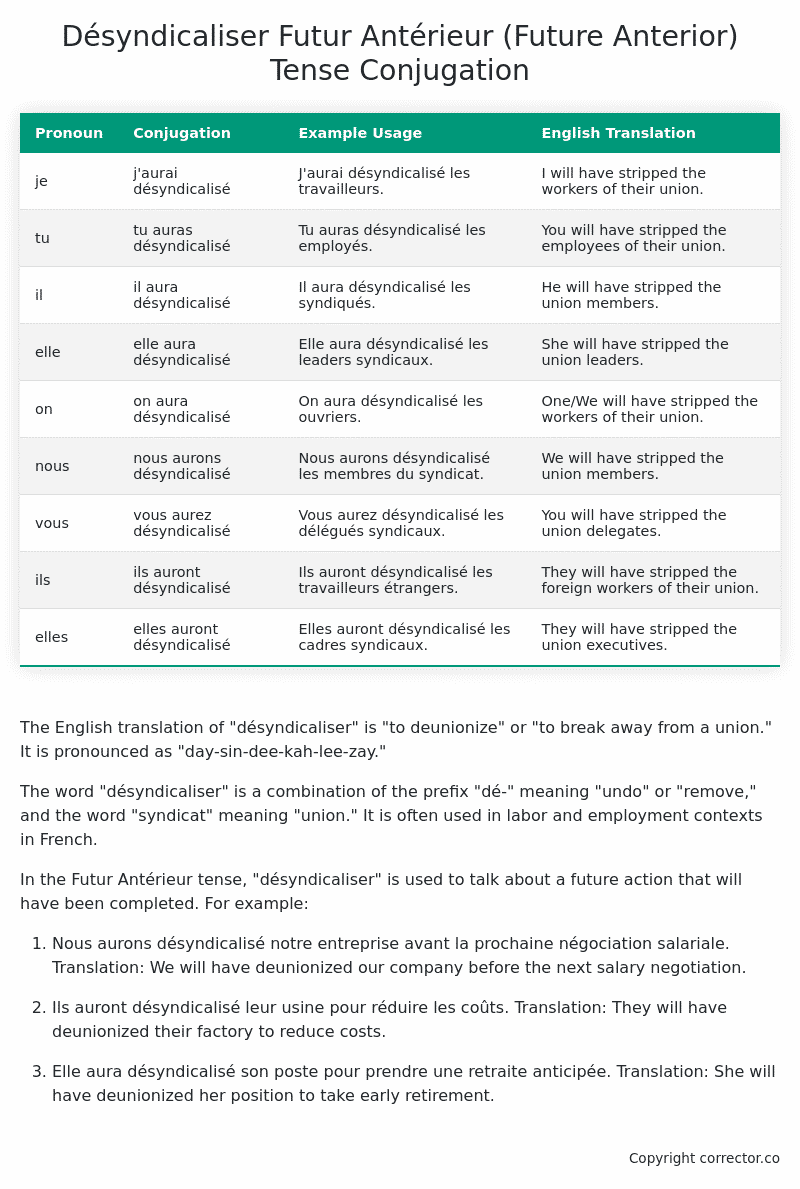Futur Antérieur (Future Anterior) Tense Conjugation of the French Verb désyndicaliser
Introduction to the verb désyndicaliser
The English translation of “désyndicaliser” is “to deunionize” or “to break away from a union.” It is pronounced as “day-sin-dee-kah-lee-zay.”
The word “désyndicaliser” is a combination of the prefix “dé-” meaning “undo” or “remove,” and the word “syndicat” meaning “union.” It is often used in labor and employment contexts in French.
In the Futur Antérieur tense, “désyndicaliser” is used to talk about a future action that will have been completed. For example:
-
Nous aurons désyndicalisé notre entreprise avant la prochaine négociation salariale.
Translation: We will have deunionized our company before the next salary negotiation. -
Ils auront désyndicalisé leur usine pour réduire les coûts.
Translation: They will have deunionized their factory to reduce costs. -
Elle aura désyndicalisé son poste pour prendre une retraite anticipée.
Translation: She will have deunionized her position to take early retirement.
Table of the Futur Antérieur (Future Anterior) Tense Conjugation of désyndicaliser
| Pronoun | Conjugation | Example Usage | English Translation |
|---|---|---|---|
| je | j’aurai désyndicalisé | J’aurai désyndicalisé les travailleurs. | I will have stripped the workers of their union. |
| tu | tu auras désyndicalisé | Tu auras désyndicalisé les employés. | You will have stripped the employees of their union. |
| il | il aura désyndicalisé | Il aura désyndicalisé les syndiqués. | He will have stripped the union members. |
| elle | elle aura désyndicalisé | Elle aura désyndicalisé les leaders syndicaux. | She will have stripped the union leaders. |
| on | on aura désyndicalisé | On aura désyndicalisé les ouvriers. | One/We will have stripped the workers of their union. |
| nous | nous aurons désyndicalisé | Nous aurons désyndicalisé les membres du syndicat. | We will have stripped the union members. |
| vous | vous aurez désyndicalisé | Vous aurez désyndicalisé les délégués syndicaux. | You will have stripped the union delegates. |
| ils | ils auront désyndicalisé | Ils auront désyndicalisé les travailleurs étrangers. | They will have stripped the foreign workers of their union. |
| elles | elles auront désyndicalisé | Elles auront désyndicalisé les cadres syndicaux. | They will have stripped the union executives. |
Other Conjugations for Désyndicaliser.
Le Present (Present Tense) Conjugation of the French Verb désyndicaliser
Imparfait (Imperfect) Tense Conjugation of the French Verb désyndicaliser
Passé Simple (Simple Past) Tense Conjugation of the French Verb désyndicaliser
Passé Composé (Present Perfect) Tense Conjugation of the French Verb désyndicaliser
Futur Simple (Simple Future) Tense Conjugation of the French Verb désyndicaliser
Futur Proche (Near Future) Tense Conjugation of the French Verb désyndicaliser
Plus-que-parfait (Pluperfect) Tense Conjugation of the French Verb désyndicaliser
Passé Antérieur (Past Anterior) Tense Conjugation of the French Verb désyndicaliser
Futur Antérieur (Future Anterior) Tense Conjugation of the French Verb désyndicaliser (this article)
Subjonctif Présent (Subjunctive Present) Tense Conjugation of the French Verb désyndicaliser
Subjonctif Passé (Subjunctive Past) Tense Conjugation of the French Verb désyndicaliser
Subjonctif Imparfait (Subjunctive Imperfect) Tense Conjugation of the French Verb désyndicaliser
Conditionnel Présent (Conditional Present) Tense Conjugation of the French Verb désyndicaliser
Conditionnel Passé (Conditional Past) Tense Conjugation of the French Verb désyndicaliser
L’impératif Présent (Imperative Present) Tense Conjugation of the French Verb désyndicaliser
L’infinitif Présent (Infinitive Present) Tense Conjugation of the French Verb désyndicaliser
Struggling with French verbs or the language in general? Why not use our free French Grammar Checker – no registration required!
Get a FREE Download Study Sheet of this Conjugation 🔥
Simply right click the image below, click “save image” and get your free reference for the désyndicaliser Futur Antérieur tense conjugation!

Désyndicaliser – About the French Futur Antérieur (Future Anterior) Tense
Construction
Common Everyday Usage Patterns
Interactions with Other Tenses
For example
Summary
I hope you enjoyed this article on the verb désyndicaliser. Still in a learning mood? Check out another TOTALLY random French verb conjugation!


